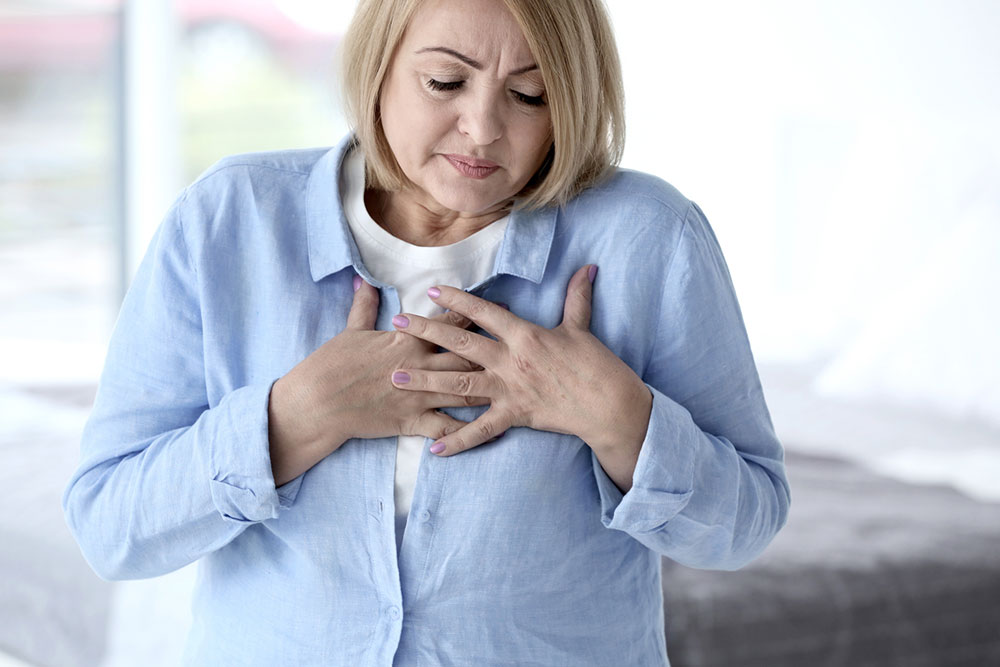10 early warning signs of a heart attack

Heart attacks typically occur when there is a blockage in one or more of the coronary arteries, which supply blood to the heart muscle. This blockage can result from plaque buildup in the arteries, causing reduced blood flow to the heart. If the blood flow is severely restricted or completely blocked, it can lead to damage to or death of the heart muscle. Here are the common early signs of a heart attack:
1. Chest pain
Also called angina, chest pain is a common early sign that indicates a clogged artery. The pain might feel like a tightness in the chest area, squeezing, or a sensation of pressure and general discomfort. People may also complain of the sensation of burning or pinching. The pain may last for a few minutes. Other reasons for chest pain may include acid reflux, muscle strain, or injury. If one experiences the pain for a few seconds, primarily upon touching a particular area around the chest, it is most likely not a result of a heart attack. Alternatively, one may not experience chest pain but still have blockages. So, it’s important to consult a health professional and check one’s heart health periodically.
2. Stinging sensation
One may also experience pain, certain discomfort, or a stinging sensation in different body parts. These sensations can extend beyond the chest area, affecting the back, shoulders, arms, or feet.
3. Jaw or throat pain
Throat or jaw pain may have several other reasons, including sinus infections or dental problems. But it can also be a sign of a heart attack, especially if the pain sits in the center of one’s chest and travels to the jaw or throat.
4. Indigestion
While it’s typically associated with digestive problems, indigestion can also be an unexpected early sign of a heart attack. Associated symptoms in this category include nausea, heartburn, diarrhea, stomach pain, or other indigestion issues. Distinguishing between common indigestion from lifestyle factors and indigestion caused by a blocked artery can be challenging. However, certain indicators can help differentiate the two. Indigestion associated with a heart attack often presents with heartburn and breathlessness and may not respond to typical home remedies. In addition, heart-related indigestion may not lead to bloating, unlike regular indigestion.
5. Dizziness
The heart pumps blood and oxygen throughout the body, keeping it energetic. But any blockages can hinder this oxygen supply and lead to feeling breathless, lightheaded, or dizzy. A person may feel like they are losing balance or fainting. These may also be caused by fast movements or dehydration, but if the symptom is associated with chest discomfort or breathlessness, they should seek prompt medical attention.
6. Fatigue
One may experience a sense of fatigue or exhaustion even after performing smaller tasks. People often describe the feeling as running a marathon after walking a few steps. If they see a significant drop in their ability to hold energy levels up throughout the day, they should check their cardiac health.
7. Snoring
Snoring, a common occurrence during sleep, can sometimes signify underlying health concerns. If the snoring is accompanied by choking or breathing difficulties, it can indicate compromised heart function. Sleep apnea is also linked to an increased risk of cardiovascular problems. The condition causes people to stop breathing and gasp during snores temporarily. Those who seem to have these issues while sleeping should consult a doctor and check their cardiovascular health.
8. Coughing
When the heart cannot meet the body’s demands, blood can leak into the lungs. This can lead to coughing up mucus in a white or pink color and a persistent cough that doesn’t seem to subside with remedies or medical attention.
9. Pain that travels down to the arm
One of the most common signs of an imminent or approaching heart attack is a pain or tingling sensation that starts on the left side of one’s chest and travels or spreads down the same arm. Any person experiencing this symptom should immediately get medical help.
10. Cold sweat
People about to experience cardiac arrest may break into a sweat due to a lack of oxygen supply to the heart muscles and severe stress on the heart.
It is recommended to call 9-1-1 immediately if one experiences severe symptoms. Some immediate treatment methods for heart attack include CPR and electric shock or defibrillation. Early and prompt treatment increases one’s chance of surviving a heart attack and ensuring the least organ damage.